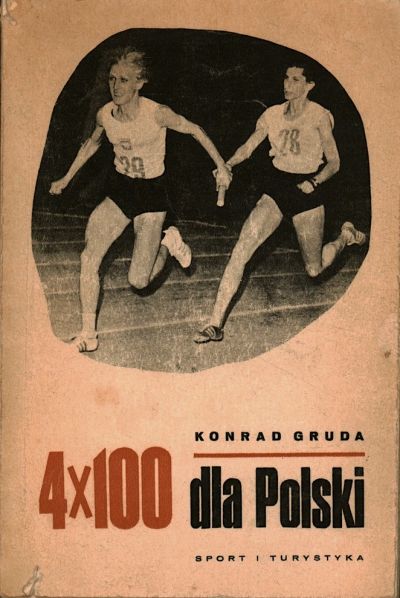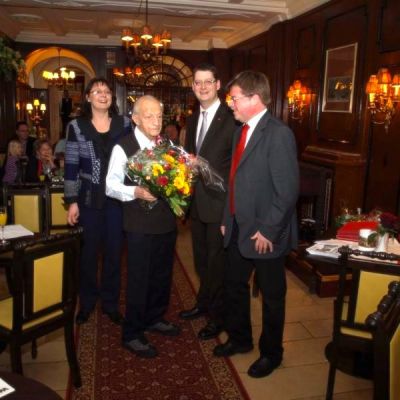Flexible in all systems. The many lives of Konrad Gruda

The war years
After the outbreak of war in 1939, he fled to Soviet-occupied Lwów (Lviv/Lemberg), where he began studying at the Institute of Soviet Trade, the former Polish Foreign Trade Academy[7]. According to his own account, however, he studied music together with his friend Jerzy Berent (1917–2003), since this was the least political of all subjects[8]. Following the German invasion of the Soviet Union in 1941, he joined the Red Army and until 1942 fought as a mercenary on the north-western section of the front. There, his main task was to ensure that the radio communications technology was functioning properly. After he was wounded in March 1942, he was sent to the Russian city of Voronezh to recuperate. He then worked as an overseer in a sawmill in Novosibirsk for several months.
From April 1943, he signed up as a volunteer with the Tadeusz Kościuszko First Infantry Division (“Berling Army”) after it was established, where he was evidently highly regarded as a “capital fellow” due to his high-level skills[9]. In October 1943, according to his own account, he took part in the battle of Lenino[10]. Initially, he belonged to the Sielce Third Infantry Regiment (May to August 1943), then joined the Smoleńszczyzna Second Infantry Regiment (July 1943 to March 1944). In each case, he was responsible for political propaganda campaigns.
In 1944, he returned to Poland with the Red Army. According to his own account, he became the head of the Bureau for Culture and Public Relations in Lublin. There, he founded the “Gazeta Lubelska” newspaper and made himself editor-in-chief[11]. In fact, under the name of Konrad Gliksman, he was a member of an army operations group headed by the later Party leader Edward Ochab, whose task it was to implement the goals of the communist July Manifesto (Manifest lipcowy) in Lublin and later in Otwock, and to create structures that would later evolve into the citizens’ militia (Milicja Obywatelska).[12] This related mainly to political-educational training work, which was designed to be explicitly distinct from the model used for the police force during the inter-war years[13]. From September 1944, Glücksmann was assigned to the artists’ group of the citizens’ militia. However, Gruda, who likely assumed his new surname in 1945, was not a member of the Communist Party; rather, he had joined the PPS socialists in 1933 as an act of defiance against his father, whom he resented[14]. In 1948, following the merger of the communist and socialist parties, he became a member of the Polish United Workers’ Party (PZPR).
[7] Roman Domaszkiewicz: Akademia Handlu Zagranicznego we Lwowie 1939–1945, in: Irena Stasiewicz-Jasiukowa (ed.): Lwowskie środowisko naukowe w latach 1939–1945. O Jakubie Karolu Parnasie, Warszawa 41993, p. 99–108.
[8] Konrad Gruda in conversation with Joanna de Vincenz for Radio Multikulti, 2001. Also formerly on his website: https://web.archive.org/web/20131112123352/http://www.konrad-gruda.de/ (last accessed on 14/2/2025).
[9] Franciszek Sielicki: Frontowa twórczość pisana Kościuszkowców, in: Wojskowy Przegląd Historyczny, 28 (1983), no. 1–3, p. 322–339, here p. 327.
[10] IPN, BU 2174/2138, p. 12.
[12] Protokół przesłuchania zastępcy komendanta głównego MO ds. politycznych Walentego Titkowa z dn. 15 października 1996 roku, in: Łukasz Kamiński/Jan Żaryń (ed.): Wokół Pogromu Kieleckiego, vol. 1, Warszawa 2006, p. 390–393, here p. 391.
[13] Zenon Jakubowski: Milicja Obywatelska 1944–1948, Warszawa 1984, p. 250–252.
[14] Konrad Gruda: Miasto, które nam wielu dało, in: Jerzy Polak/Janusz Spyra (ed.): Żydzi w Bielsku, Białej i okolicy, Bielsko-Biała 1996, p. 154/155.




![Konrad Gruda: Zwölf Uhr einundvierzig. Wird Jan der tödlichen Gefahr entrinnen?, München 1979 [1975] Konrad Gruda: Zwölf Uhr einundvierzig. Wird Jan der tödlichen Gefahr entrinnen?, München 1979 [1975] - Book cover](/sites/default/files/styles/width_100_tiles/public/assets/images/Konrad%20Gruda_Zwo%CC%88lf%20Uhr%20einundvierzig.%20Wird-Jan-der-to%CC%88dlichen-Gefahr-entrinnen.jpg?itok=z9Cru2Qk)




